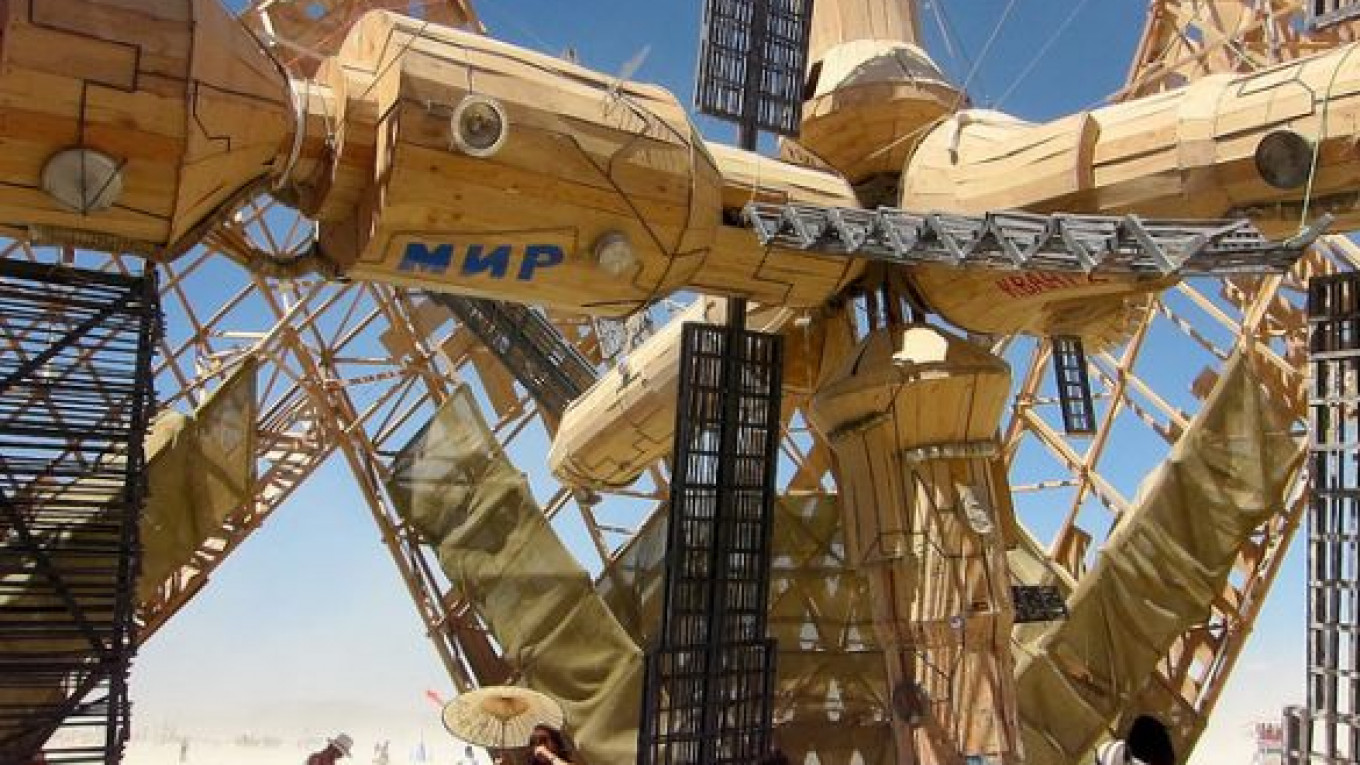Burning Man, an annual festival that began as a summer solstice gathering in 1986, now sees more than 50,000 participants descend upon Nevada's Black Rock Desert every summer, arriving in elaborately constructed floats and mutant vehicles and dressed in all manner of costumes to construct one of the largest planned temporary cities, which includes an airport.
The festival, which includes art performances, workshops, music and much more, culminates in the ritual burning of a 100-foot-tall effigy at the end of the week-long event.
Its attendees, known as "burners," include a wide range of artists and hippies, who generally share the same ethos of creative freedom, radical self expression, and other ideals outlined in the festival's "10 basic principles."
The themed camps, art installations and musical performances that the festival is known for can now be experienced without the need to travel to Black Rock Desert, as one of its new satellite events will take place this weekend at Moscow's Arma17 nightclub, albeit on a much smaller scale than the main festival.
Satellite events are organized to create a tight community of like-minded people, especially those working in community art. Katya Vinnikova, who is helping organize the Russian edition explains: "The Russian burners are donating their time and helping build a community here. We are lucky to have some incredible Russian artists who have created projects at Burning Man throughout the past few years, and now the Russian Burning Man community is ready for the next step, which is to bring it to Moscow."
It is completely organized by volunteers and artists, who are also its participants, "people who have been to Burning Man and want to bring some of the learnings, ideas and the principles back to their home countries."
The main installation will be created by Empty Hills, a group of Russian artists and engineers, whose "Cradle of MIR" installation was one of the most well-received at the 2013 edition of the festival.
There are no sponsors or brands involved and, refreshingly for Moscow, the party is open to everyone with no guest lists or face control, with the goal that everyone who attends feels like a participant.
Nikolai Semyonov is the art director of the Moscow event, and apart from musical performances, highlights include a UFO installation by Margo Trushina; artists from art residence Guslitsa; performances by the Odalisque dance group and Liudamila; sea sketches by Vladimir Smyshlenkov; and Lum Theatre, a theatre of optical illusions. There will also be light installations by Roman Krylov and the studio Powerpony.
The art community has much to look forward to, as Vinnikova tells me of plans for a "pre-compression" in spring, where there will be art residences and workshops for Russian artists willing to bring their ideas to the main festival itself.
It all sounds like a lot of work, but also a lot of fun. "We've all worked so hard to create the event at Black Rock City that now we just want to decompress, have a party, bring all the things we love under one roof and enjoy a little taste of the world we love, for one night, in our own city," says Vinnikova, adding that we should "expect a lot of Russian flavor."
Burning Man Moscow Decompression takes place Nov. 23, 8 p.m, at Arma17, 5 Nizhny Susalnyy Pereulok, Metro Kurskaya.
Contact the author at t.misir@imedia.ru
A Message from The Moscow Times:
Dear readers,
We are facing unprecedented challenges. Russia's Prosecutor General's Office has designated The Moscow Times as an "undesirable" organization, criminalizing our work and putting our staff at risk of prosecution. This follows our earlier unjust labeling as a "foreign agent."
These actions are direct attempts to silence independent journalism in Russia. The authorities claim our work "discredits the decisions of the Russian leadership." We see things differently: we strive to provide accurate, unbiased reporting on Russia.
We, the journalists of The Moscow Times, refuse to be silenced. But to continue our work, we need your help.
Your support, no matter how small, makes a world of difference. If you can, please support us monthly starting from just $2. It's quick to set up, and every contribution makes a significant impact.
By supporting The Moscow Times, you're defending open, independent journalism in the face of repression. Thank you for standing with us.
Remind me later.






